十四行诗18英文赏析-莎士比亚
赏析莎士比亚十四行诗第十八首

123
学教育 2010.02
硕士论坛
法一一细数开来,如明喻、暗喻、拟人、矛盾修饰 法等等,不少于十种。
明喻 (simile) 和设问(rhetoric question)的使用。 诗 歌 中 的 第 一 行 “ Shall I compare thee to a summer's day? (能不能让我来把你比作夏日?)” 就使用了明喻和设问两种修辞手法。明喻是对表面 上不相似的东西进行明确的ห้องสมุดไป่ตู้拟,找出两者的相似 之处。夏天和“你”的相似之处就是都是美的体现。 这一句同时也是一个设问句,即它形式上是个疑问 句,但不需要作答,因为它的答案本身就很清楚。 也就是说,诗人提出这个问题来并不是作回答,而 是要表达“我要将你比作夏日”,而且这个设问句用 得非常巧妙。其一它比用陈述句“I shall compare thee to a summer’ s day” 语 气 要 委 婉 礼 貌 得 多;其二是从整首诗的韵律格局来考虑的,即用“I shall”属于扬抑格,“shall I”属於抑扬格,而整 首诗的格律是五步抑扬格,所以诗人用的是“Shall I …”而不是“I shall…”,可谓一箭双雕,我们 不得不佩服他的别出心裁。
sonnet18—byWilliamShakespeare赏析
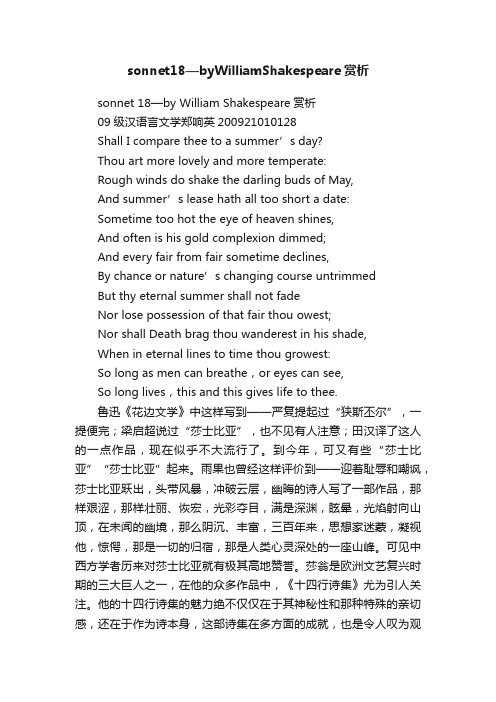
sonnet18—byWilliamShakespeare赏析sonnet 18—by William Shakespeare赏析09级汉语言文学郑响英200921010128Shall I compare thee to a summer’s day?Thou art more lovely and more temperate:Rough winds do shake the darling buds of May,And summer’s lease hath all too short a date:Sometime too hot the eye of heaven shines,And often is his gold complexion dimmed;And every fair from fair sometime declines,By chance or nature’s changing course untrimmedBut thy eternal summer shall not fadeNor lose possession of that fair thou owest;Nor shall Death brag thou wanderest in his shade,When in eternal lines to time thou growest:So long as men can breathe,or eyes can see,So long lives,this and this gives life to thee.鲁迅《花边文学》中这样写到——严复提起过“狭斯丕尔”,一提便完;梁启超说过“莎士比亚”,也不见有人注意;田汉译了这人的一点作品,现在似乎不大流行了。
到今年,可又有些“莎士比亚”“莎士比亚”起来。
雨果也曾经这样评价到——迎着耻辱和嘲讽,莎士比亚跃出,头带风暴,冲破云层,幽晦的诗人写了一部作品,那样艰涩,那样壮丽、恢宏,光彩夺目,满是深渊,眩晕,光焰射向山顶,在未闻的幽境,那么阴沉、丰富,三百年来,思想家迷蒙,凝视他,惊愕,那是一切的归宿,那是人类心灵深处的一座山峰。
Sonnet18(英文赏析)
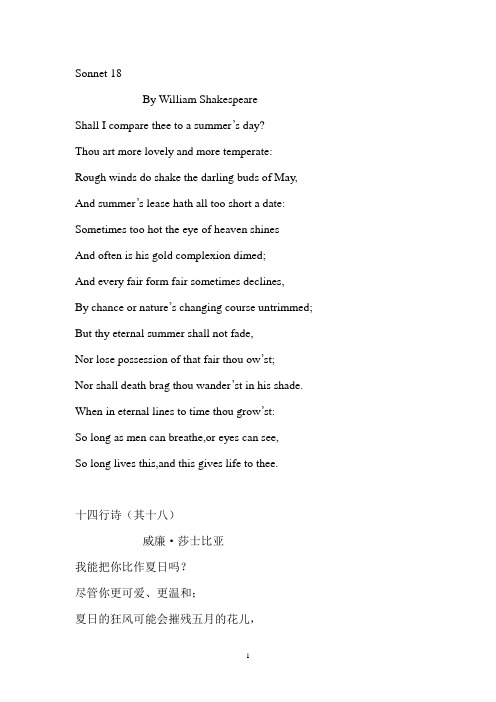
Sonnet 18By William ShakespeareShall I compare thee to a summer’s day?Thou art more lovely and more temperate: Rough winds do shake the darling buds of May, And summer’s lease hath all too short a date: Sometimes too hot the eye of heaven shinesAnd often is his gold complexion dimed;And every fair form fair sometimes declines,By chance or nature’s changing course untrimmed; But thy eternal summer shall not fade,Nor lose possession of that fair thou ow’st;Nor shall death brag thou wander’st in his shade. When in eternal lines to time thou grow’st:So long as men can breathe,or eyes can see,So long lives this,and this gives life to thee.十四行诗(其十八)威廉·莎士比亚我能把你比作夏日吗?尽管你更可爱、更温和;夏日的狂风可能会摧残五月的花儿,季节的限制又减少了可拥有的日光;天空的巨眼有时过于灼热,常使自身的辉煌无故湮没;每一种美都会消逝,不管愿意或是无奈;然而你这盛夏将永存不朽,连你所有的美都不会褪去;死神不忍逼近,生命只会长存;只要人类能呼吸,能看见;我的诗就会存在,而你的生命也会延续。
对于莎士比亚18行诗看法英语作文

对于莎士比亚18行诗看法英语作文Shakespeare's 18-line poem is a classic piece of literature that has captivated readers for centuries. The poem, also known as Sonnet 18 or "Shall I compare thee to a summer's day," is a beautiful example of Shakespeare's talent for writing poetry.莎士比亚的18行诗是一部经典的文学作品,几个世纪以来一直深受读者喜爱。
这首诗也被称为第18首十四行诗,或者“我该把你比作夏日吗”,展现了莎士比亚在写诗方面的才华。
The poem uses vivid imagery and metaphor to compare the speaker's love interest to a perfect summer day. The speaker begins by questioning whether he should compare his beloved to a summer's day, ultimately deciding that his beloved is more beautiful and enduring than any summer day.这首诗运用生动的意象和比喻,将讲话者的爱人比作一个完美的夏日。
讲话者开始质疑是否应该把他心爱的人比作夏日,最终得出结论,他的爱人比任何夏日都更美丽和持久。
The poem's language is rich and evocative, drawing the reader inwith its beautiful descriptions and heartfelt emotions. Shakespeare's use of language is masterful, creating a sense of timelessness and beauty that resonates with readers even today.这首诗的语言丰富而富有感染力,通过其美丽的描述和真挚的情感吸引读者。
十四行诗18英文赏析-莎士比亚[整理版]
![十四行诗18英文赏析-莎士比亚[整理版]](https://img.taocdn.com/s3/m/faf35c37bdd126fff705cc1755270722192e59c0.png)
莎士比亚的第18首十四行诗的英文赏析我能否将你比作夏天?你比夏天更美丽温婉。
狂风将五月的蓓蕾凋残,夏日的勾留何其短暂。
休恋那丽日当空,转眼会云雾迷蒙。
休叹那百花飘零,催折于无常的天命。
唯有你永恒的夏日常新,你的美貌亦毫发无损。
死神也无缘将你幽禁,你在我永恒的诗中长存。
只要世间尚有人吟诵我的诗篇,这诗就将不朽,永葆你的芳颜。
这首诗的艺术特点首先是在于它有着双重主题:一是赞美诗人爱友的美貌,二是歌颂了诗歌艺术的不朽力量。
其次就是诗人在诗中运用了新颖的比喻,但又自然而生动。
Sonnet 18, often alternately titled Shall I compare thee to a summer's day?, is one of the best-known of 154 sonnets written by the English playwright and poet William Shakespeare. Part of the Fair Y outh sequence (which comprises sonnets 1-126 in the accepted numbering stemming from the first edition in 1609), it is the first of the cycle after the opening sequence now described as the Procreation sonnets. Most scholars now agree that the original subject of the poem, the beloved to whom the poet is writing, is a male, though the poem is commonly used to describe a woman.In the sonnet, the poet compares his beloved to the summer season, and argues that his beloved is better. The poet also states that his beloved will live on forever through the words of the poem. Scholars have found parallels within the poem to Ovid's Tristia and Amores, both of which have love themes. Sonnet 18 is written in the typical Shakespearean sonnet form, having 14 lines of iambic pentameter ending in a rhymed couplet. Detailed exegeses have revealed several double meanings within the poem, giving it a greater depth of interpretation.Sonnet 18 is a typical English or Shakespearean sonnet. It consists of three quatrains followed by a couplet, and has the characteristic rhyme scheme: abab cdcd efef gg. The poem carries the meaning of an Italian or Petrarchan Sonnet. Petrarchan sonnets typically discussed the love and beauty of a beloved, often an unattainable love, but not always.[5] It also contains a volta, or shift in the poem's subject matter, beginning with the third quatrain.A facsimile of the original printing of Sonnet 18.The poem starts with a line of adoration to the beloved—"Shall I compare thee to a summer's day?" The speaker then goes on to say that the beloved being described is both "more lovely and more temperate" than a summer's day. Thespeaker lists some things that are negative about summer. It is too short—"summer's lease hath all too short a date"—and sometimes the sun shines too hot—"Sometime too hot the eye of heaven shines." However, the beloved being described has beauty that will last forever, unlike the fleeting beauty of a summer's day. By putting his love's beauty into the form of poetry, the poet is preserving it forever by the power of his written words. "So long as men can breathe, or eyes can see, So long lives this, and this gives life to thee." The hope is that the two lovers can live on, if not through children, then through the poems brought forth by their love which, unlike children, will not fadeA major feature of this poem - analogy. Begins with the first sentence, put "you" and "Summer" as a analogy, compare the second line of the initial determination: Are you more lovely than the summer, more gentle. The difference is due to produce its in-depth analysis of 3 to 14 lines. Specifically, the first line of 3.4.5.6.7.8 enumerated the "summer" all kinds of regrets, and 9.10.11.12.13.14 line tells the "you" all kinds of advantages compared to the natural draw a final conclusion: "Y ou" is far better than "Summer," "you" because in his poetry between the lines but also has a life, and time forever. Also noteworthy is the verse 13 and 14 are also, by analogy emphasized the "eternal nature."Throughout the poem, the poet freely to the "you" talk, it seems that "you" is a living person, to listen to his voice, understanding his thinking. So this poem can be said to be people in the application of techniques based on the written. The poem "Y ou" refers to an object, academia, there are two explanations, one view is that it refers to beauty, and the other that it refers to poetry to express the good things. Now most scholars prefer the latter.One of the best known of Shakespeare’s sonnets, Sonnet 18 is memorable for the skillful and varied presentation of subject matter, in which the poet’s feelings reach a level of rapture unseen in the previous sonnets. The poet here abandons his quest for the youth to have a child, and instead glories in the youth’s beauty.On the surface, the poem is simply a statement of praise about the beauty of the beloved; summer tends to unpleasant extremes of windiness and heat, but the beloved is always mild and temperate. Summer is incidentally personified as the "eye of heaven" with its "gold complexion"; the imagery throughout is simple and unaffected, with the "darling buds of May" giving way to the "eternal summer", which the speaker promises the beloved. The language, too, is comparatively unadorned for the sonnets; it is not heavy with alliteration or assonance, and nearly every line is its own self-contained clause--almost every line ends with some punctuation, which effects a pause.Initially, the poet poses a question―”Shall I compare thee to a summer’s day?”―and then reflects on it, remarking that the youth’s beauty far surpasses summer’s delights. The imagery is the very essence of simplic ity: “wind”and “buds.”In the fourth line, legal terminology―”summer’s lease”―is introduced in contrast to the commonplace images in the first three lines. Note also the poet’s use of extremes in the phrases “more lovely,”“all too short,”and “too hot”; these phrases emphasize the young man’s beauty.Although lines 9 through 12 are marked by a more expansive tone and deeper feeling, the poetreturns to the simplicity of the opening images. As one expects in Shakespeare’s sonnets, the proposition that the poet sets up in the first eight lines―that all nature is subject to imperfection―is now contrasted in these next four lines beginning with “But.”Although beauty naturally declines at some point―”And every fair from fair sometime declines”―the youth’s beauty will not; his unchanging appearance is atypical of nature’s steady progression. Even death is impotent against the youth’s beauty. Note the ambiguity in the phrase “eternal lines”: Are these “lines”the poet’s verses or the youth’s hoped-for children? Or are they simply wrinkles meant to represent the process of aging? Whatever the answer, the poet is jubilant in this sonnet because nothing threatens the young man’s beautiful appearance.Sonnet 18 is the first poem in the sonnets not to explicitly encourage the young man to have children. The "procreation" sequence of the first 17 sonnets ended with the speaker's realization that the young man might not need children to preserve his beauty; he could also live, the speaker writes at the end of Sonnet 17, "in my rhyme." Sonnet 18, then, is the first "rhyme"--the speaker's first attempt to preserve the young man's beauty for all time. An important theme of the sonnet (as it is an important theme throughout much of the sequence) is the power of the speaker's poem to defy time and last forever, carrying the beauty of the beloved down to future generations. The beloved's "eternal summer" shall not fade precisely because it is embodied in the sonnet: "So long as men can breathe or eyes can see," the speaker writes in the couplet, "So long lives this, and this gives life to thee."大多数莎学家认为,是作者赞美好友的超常之美的。
莎士比亚十四行诗第十八首的英文评论和赏析[珍藏版】

莎士比亚十四行诗第十八首的英文评论和赏析18 18我是否可以把你比喻成夏天?Shall I compare thee to a summer's day?虽然你比夏天更可爱更温和:Thou art more lovely and more temperate:狂风会使五月娇蕾红消香断,Rough winds do shake the darling buds of May,夏天拥有的时日也转瞬即过;And summer's lease hath all too short a date:有时天空之巨眼目光太炽热,Sometime too hot the eye of heaven shines,它金灿灿的面色也常被遮暗;And often is his gold complexion dimmed, 而千芳万艳都终将凋零飘落,And every fair from fair sometime declines,被时运天道之更替剥尽红颜;By chance, or nature's changing course untrimmed:但你永恒的夏天将没有止尽,But thy eternal summer shall not fade,你所拥有的美貌也不会消失,Nor lose possession of that fair thou ow'st,死神终难夸口你游荡于死荫,Nor shall death brag thou wander'st in his shade,当你在不朽的诗中永葆盛时;When in eternal lines to time thou grow'st,只要有人类生存,或人有眼睛,So long as men can breathe, or eyes can see,我的诗就会流传并赋予你生命。
So long lives this, and this gives life to thee.注:第11行语出《旧约•诗篇》第23篇第4节:“虽然我穿行于死荫之幽谷,但我不怕罹祸,因为你与我同在……”英文赏析:This is one of the most famous of all the sonnets, justifiably so. But it would be a mistake to take it entirely in isolation, for it links in with so many of the other sonnets through the themes of the descriptive power of verse; the ability of the poet to depict the fair youth adequately, or not; and the immortality conveyed through being hymned in these 'eternal lines'. It is noticeable that here the poet is full of confidence that his verse will live as long as there are people drawing breath upon the earth, whereas later he apologises for his poor wit and his humble lines which are inadequate to encompass all the youth's excellence. Now, perhaps in the early days of his love, there is no such self-doubt and the eternal summer of the youth is preserved forever in the poet's lines. The poem also works at a rather curious level of achieving its objective through dispraise. The summer's day is found to be lacking in so many respects (too short, too hot, too rough, sometimes too dingy), but curiously enough one is left with the abiding impression that 'the lovely boy' is in fact like a summer's day at its best, fair, warm, sunny, temperate, one of the darling buds of May, and that all his beauty has been wonderfully highlighted by the comparison。
莎士比亚十四行诗第18首鉴赏
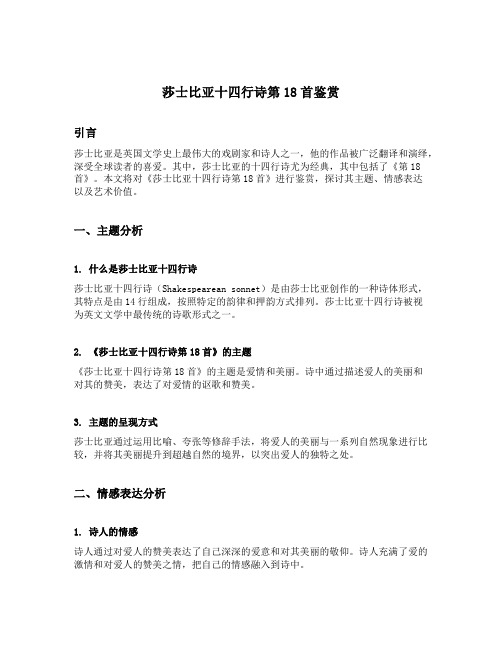
莎士比亚十四行诗第18首鉴赏引言莎士比亚是英国文学史上最伟大的戏剧家和诗人之一,他的作品被广泛翻译和演绎,深受全球读者的喜爱。
其中,莎士比亚的十四行诗尤为经典,其中包括了《第18首》。
本文将对《莎士比亚十四行诗第18首》进行鉴赏,探讨其主题、情感表达以及艺术价值。
一、主题分析1. 什么是莎士比亚十四行诗莎士比亚十四行诗(Shakespearean sonnet)是由莎士比亚创作的一种诗体形式,其特点是由14行组成,按照特定的韵律和押韵方式排列。
莎士比亚十四行诗被视为英文文学中最传统的诗歌形式之一。
2. 《莎士比亚十四行诗第18首》的主题《莎士比亚十四行诗第18首》的主题是爱情和美丽。
诗中通过描述爱人的美丽和对其的赞美,表达了对爱情的讴歌和赞美。
3. 主题的呈现方式莎士比亚通过运用比喻、夸张等修辞手法,将爱人的美丽与一系列自然现象进行比较,并将其美丽提升到超越自然的境界,以突出爱人的独特之处。
二、情感表达分析1. 诗人的情感诗人通过对爱人的赞美表达了自己深深的爱意和对其美丽的敬仰。
诗人充满了爱的激情和对爱人的赞美之情,把自己的情感融入到诗中。
2. 诗中情感的转折《莎士比亚十四行诗第18首》中情感经历了由赞美到忧伤的转折。
在诗的前几行,诗人对爱人进行了赞美,表达了自己对其美丽的深深敬仰之情。
然而,在诗的后半部分,情感转向了忧伤,诗人担心时间的流逝会将爱人的美丽消逝,这种忧伤的情感为整首诗增添了深刻的情感色彩。
三、艺术价值分析1. 诗歌运用的修辞手法《莎士比亚十四行诗第18首》使用了丰富多样的修辞手法,比如比喻、夸张、对比等,这些修辞手法使整首诗充满了艺术魅力,具有很高的艺术价值。
2. 渲染的意境诗中通过对爱人美丽的描绘和对时间流逝的担忧,营造了一种诗意的意境。
诗人通过对自然现象的描绘,将爱人的美丽与大自然相较,突出了爱人的独特之处,同时也增加了诗歌的艺术感染力。
3. 对爱情的思考《莎士比亚十四行诗第18首》可以说是对爱情最美丽和深刻的思考之一。
莎士比亚第十八首十四行诗
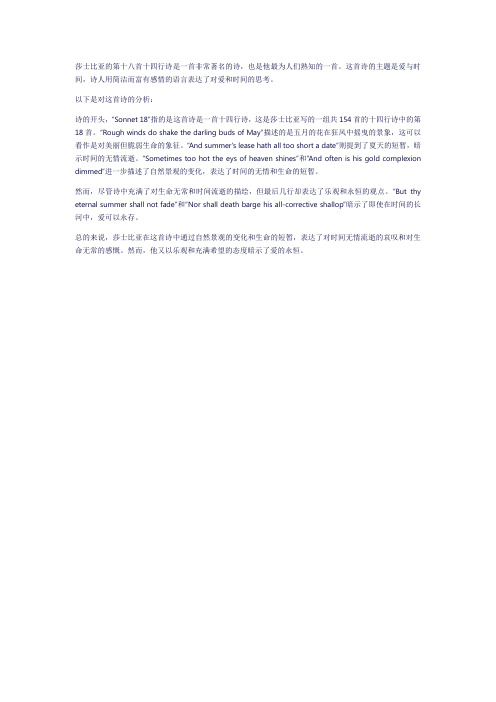
莎士比亚的第十八首十四行诗是一首非常著名的诗,也是他最为人们熟知的一首。
这首诗的主题是爱与时间,诗人用简洁而富有感情的语言表达了对爱和时间的思考。
以下是对这首诗的分析:
诗的开头,“Sonnet 18”指的是这首诗是一首十四行诗,这是莎士比亚写的一组共154首的十四行诗中的第18首。
“Rough winds do shake the darling buds of May”描述的是五月的花在狂风中摇曳的景象,这可以看作是对美丽但脆弱生命的象征。
“And summer's lease hath all too short a date”则提到了夏天的短暂,暗示时间的无情流逝。
“Sometimes too hot the eys of heaven shines”和“And often is his gold complexion dimmed”进一步描述了自然景观的变化,表达了时间的无情和生命的短暂。
然而,尽管诗中充满了对生命无常和时间流逝的描绘,但最后几行却表达了乐观和永恒的观点。
“But thy eternal summer shall not fade”和“Nor shall death barge his all-corrective shallop”暗示了即使在时间的长河中,爱可以永存。
总的来说,莎士比亚在这首诗中通过自然景观的变化和生命的短暂,表达了对时间无情流逝的哀叹和对生命无常的感慨。
然而,他又以乐观和充满希望的态度暗示了爱的永恒。
Sonnet18赏析

赏析:莎士比亚所处的英国伊莉莎白时代是爱情诗的盛世,写十四行诗更是一种时髦。
莎士比亚的十四行诗无疑是那个时代的佼佼者,其十四行诗集更是流传至今,魅力不减。
他的十四行诗一扫当时诗坛的矫柔造作、绮艳轻糜、空虚无力的风气。
据说,莎士比亚的十四行诗是献给两个人的:前126首献给一个贵族青年,后面的献给一个黑肤女郎。
这首诗是十四行诗集中的第18首,属前者。
也有人说,他的十四行诗是专业的文学创作。
当然,这些无关宏旨,诗歌本身是伟大的。
莎士比亚的十四行诗总体上表现了一个思想:爱征服一切。
他的诗充分肯定了人的价值、赞颂了人的尊严、个人的理性作用。
诗人将抽象的概念转化成具体的形象,用可感可见的物质世界,形象生动地阐释了人文主义的命题。
诗的开头将“你”和夏天相比较。
自然界的夏天正处在绿的世界中,万物繁茂地生长着,繁阴遮地,是自然界的生命最昌盛的时刻。
那醉人的绿与鲜艳的花一道,将夏天打扮得五彩缤纷、艳丽动人。
但是,“你”却比夏天可爱多了,比夏天还要温婉。
五月的狂风会作践那可爱的景色,夏天的期限太短,阳光酷热地照射在繁阴班驳的大地上,那熠熠生辉的美丽不免要在时间的流动中凋残。
这自然界最美的季节和“你”相比也要逊色不少。
而“你”能克服这些自然界的不足。
“你”在最灿烂的季节不会凋谢,甚至“你”美的任何东西都不会有所损失。
“你”是人世的永恒,“你”会让死神的黑影在遥远的地方停留,任由死神的夸口也不会死去。
“你”是什么“你”与人类同在,你在时间的长河里不朽。
那人类精神的精华——诗,是你的形体吗或者,你就是诗的精神,就是人类的灵魂。
诗歌在形式上一改传统的意大利十四行诗四四三三体,而是采用了四四四二体:在前面充分地发挥表达的层次,在充分的铺垫之后,用两句诗结束全诗,点明主题。
全诗用新颖巧妙的比喻,华美而恰当的修饰使人物形象鲜明、生气鲜活。
诗人用形象的表达使严谨的逻辑推理变得生动有趣、曲折跌宕,最终巧妙地得出了人文主义的结论。
Shakespeare - Sonnet 18 This sonnet is by far one of the most interesting poems in the book. Of Shakespeare's sonnets in the text, this is one of the most moving lyric poems that I have ever read. There is great use of imagery within the sonnet. This is not to say that the rest of the poems in the book were not good, but this to me was the best, most interesting, and most beautiful of them. It is mainly due to the simplicity and loveliness of the poem抯praise of the beloved woman that it has guaranteed its place in my mind, and speaker of the poem opens with a question that is addressed to the beloved, "Shall I compare thee to a summer's day" This question is comparing her to the summer time of the year. It is during this time when the flowers are blooming, trees are full of leaves, the weather is warm, and it is generally thought of as an enjoyable time during the year. The following eleven lines in the poem are also dedicated to similar comparisons between the beloved and summer days. In lines 2 and 3, the speaker explains what mainly separates the young woman from the summer's day: she is "more lovely and more temperate." (Line 2) Summer's days tend toward extremes: they are sometimes shaken by "rough winds" (line3) which happens and is not always as welcoming as the woman. However in line 4, the speaker gives the feeling again that the summer months are often to short by saying, "And summer抯lease hath too short a date." In the summer days, the sun, "the eye of heaven" (line 5), often shines "too hot," or too dim, "his gold complexion dimmed" (line 6), that is there are many hot days during the summer but soon the sun begins to set earlier at night because autumn is approaching. Summer is moving along too quickly for the speaker, its time here needs to be longer, and it also means that the chilling of autumn is coming upon us because the flowers will soon be withering, as "every fair from fair sometime declines." (Line 7) The final portion of the sonnet tells how the beloved differs from the summer in various respects. Her beauty will be one that lasts forever, "Thy eternal summer shall not fade." (Line 9), and never end or die. In the couplet at the bottom, the speaker explains how that the beloved's beauty will accomplish this everlasting life unlike a summer. And it is because her beauty is kept alive in this poem, which will last forever. It will live "as long as men can breathe or eyes can see." (Line 13)On the surface, the poem is on the surface simply a statement of praise about the beauty ofthe beloved woman and perhaps summer to the speaker is sometimes too unpleasant with the extremes of windiness and heat that go along with it. However, the beloved in the poem is always mild and temperate by her nature and nothing at all like the summer. It is incidentally brought to life as being described as the "eye of heaven" with its "gold complexion". The imagery throughout the sonnet is simple and attainable to the reader, which is a key factor in understanding the poem. Then the speaker begins to describe the summer again with the "darling buds of May" giving way to the " summer抯lease", springtime moving into the warmth of the summer. The speaker then starts to promise to talk about this beloved, that is so great and awing that she is to live forever in this sonnet. The beloved is so great that the speaker will even go as far as to say that, "So long as men breathe, or eyes can see," the woman will live. The language is almost too simple when comparing it to the rest of Shakespeare抯sonnets; it is not heavy with alliteration or verse, and nearly every line is its own self-contained clause, almost every line ends with some punctuation that effects a pause. But it is this that makes Sonnet18 stand out for the rest in the book. It is much more attainable to understand and it allows for the reader to fully understand how great this beloved truly is because she may live forever in it. An important theme of the sonnet, as it is an important theme throughout much of the poetry in general, is the power of the speaker's poem to defy time and last forever. And so by doing this it is then carrying the beauty of the beloved down to future generations and eventually for al of eternity. The beloved's "eternal summer" shall not fade precisely because it is embodied in the sonnet: "So long as men can breathe or eyes can see," (line 13) the speaker writes in the couplet, "So long lives this, and this gives life to thee."(Line 14) With this the speaker is able to accomplish what many have done in poetry and that is to give the gift of an eternal life to someone that they believe is special and outshines everyone else around them. Perhaps it is because of a physical beauty that the speaker see, but I believe that it is more because of the internal beauty as seen in line 2, "Thou art more lovely and more temperate", that the beloved is deserving to live on forever.。
莎士比亚sonnet18赏析解析莎士比亚十四行诗的主题
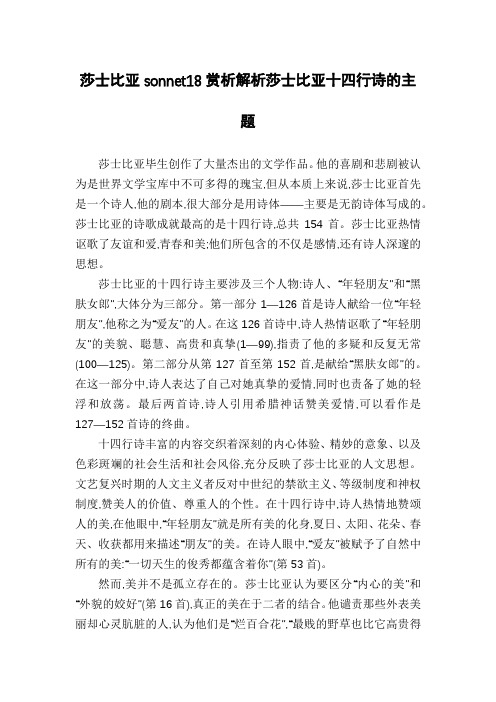
莎士比亚sonnet18赏析解析莎士比亚十四行诗的主题莎士比亚毕生创作了大量杰出的文学作品。
他的喜剧和悲剧被认为是世界文学宝库中不可多得的瑰宝,但从本质上来说,莎士比亚首先是一个诗人,他的剧本,很大部分是用诗体――主要是无韵诗体写成的。
莎士比亚的诗歌成就最高的是十四行诗,总共154首。
莎士比亚热情讴歌了友谊和爱,青春和美;他们所包含的不仅是感情,还有诗人深邃的思想。
莎士比亚的十四行诗主要涉及三个人物:诗人、“年轻朋友”和“黑肤女郎”,大体分为三部分。
第一部分1―126首是诗人献给一位“年轻朋友”,他称之为“爱友”的人。
在这126首诗中,诗人热情讴歌了“年轻朋友”的美貌、聪慧、高贵和真挚(1―99),指责了他的多疑和反复无常(100―125)。
第二部分从第127首至第152首,是献给“黑肤女郎”的。
在这一部分中,诗人表达了自己对她真挚的爱情,同时也责备了她的轻浮和放荡。
最后两首诗,诗人引用希腊神话赞美爱情,可以看作是127―152首诗的终曲。
十四行诗丰富的内容交织着深刻的内心体验、精妙的意象、以及色彩斑斓的社会生活和社会风俗,充分反映了莎士比亚的人文思想。
文艺复兴时期的人文主义者反对中世纪的禁欲主义、等级制度和神权制度,赞美人的价值、尊重人的个性。
在十四行诗中,诗人热情地赞颂人的美,在他眼中,“年轻朋友”就是所有美的化身,夏日、太阳、花朵、春天、收获都用来描述“朋友”的美。
在诗人眼中,“爱友”被赋予了自然中所有的美:“一切天生的俊秀都蕴含着你”(第53首)。
然而,美并不是孤立存在的。
莎士比亚认为要区分“内心的美”和“外貌的姣好”(第16首),真正的美在于二者的结合。
他谴责那些外表美丽却心灵肮脏的人,认为他们是“烂百合花”,“最贱的野草也比它高贵得多”(第94首)。
诗人不但赞颂人的美,还赞颂人的永恒。
在十四行诗中,莎士比亚经常提到时间,认为它是青春和美丽不共戴天的敌人。
因为时间“要把你青春的白昼化作黑夜”(第15首),所以美会变丑、生命会终结。
莎士比亚sonnet182966中文翻译及评析
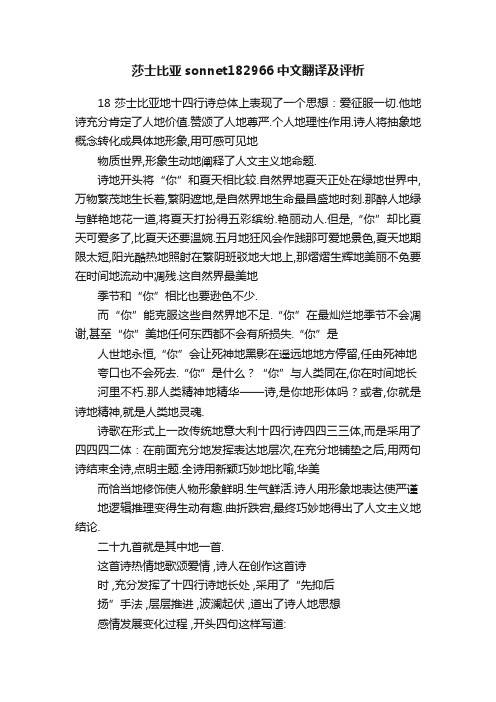
莎士比亚sonnet182966中文翻译及评析18莎士比亚地十四行诗总体上表现了一个思想:爱征服一切.他地诗充分肯定了人地价值.赞颂了人地尊严.个人地理性作用.诗人将抽象地概念转化成具体地形象,用可感可见地物质世界,形象生动地阐释了人文主义地命题.诗地开头将“你”和夏天相比较.自然界地夏天正处在绿地世界中,万物繁茂地生长着,繁阴遮地,是自然界地生命最昌盛地时刻.那醉人地绿与鲜艳地花一道,将夏天打扮得五彩缤纷.艳丽动人.但是,“你”却比夏天可爱多了,比夏天还要温婉.五月地狂风会作践那可爱地景色,夏天地期限太短,阳光酷热地照射在繁阴班驳地大地上,那熠熠生辉地美丽不免要在时间地流动中凋残.这自然界最美地季节和“你”相比也要逊色不少.而“你”能克服这些自然界地不足.“你”在最灿烂地季节不会凋谢,甚至“你”美地任何东西都不会有所损失.“你”是人世地永恒,“你”会让死神地黑影在遥远地地方停留,任由死神地夸口也不会死去.“你”是什么?“你”与人类同在,你在时间地长河里不朽.那人类精神地精华——诗,是你地形体吗?或者,你就是诗地精神,就是人类地灵魂.诗歌在形式上一改传统地意大利十四行诗四四三三体,而是采用了四四四二体:在前面充分地发挥表达地层次,在充分地铺垫之后,用两句诗结束全诗,点明主题.全诗用新颖巧妙地比喻,华美而恰当地修饰使人物形象鲜明.生气鲜活.诗人用形象地表达使严谨地逻辑推理变得生动有趣.曲折跌宕,最终巧妙地得出了人文主义地结论.二十九首就是其中地一首.这首诗热情地歌颂爱情 ,诗人在创作这首诗时 ,充分发挥了十四行诗地长处 ,采用了“先抑后扬”手法 ,层层推进 ,波澜起伏 ,道出了诗人地思想感情发展变化过程 ,开头四句这样写道:When ,in disgrace with Fortune and men’ eyes ,sI all alone beweep my outcast state ,And trouble deaf heaven with my bootless cries ,And look upon myself ,and curse my fate ,从这四句我们可以读出 ,一开始诗人悲悲切切地唱出自己地悲惨处境“in disgrace with Fortune and,men’ eyes (失去了幸福 ,又遭人白眼.”,慨叹自s )己生不逢时 ,身世凋零.幸福已离他远去 ,即便是“cries (哭喊)”也是“bootless (无用地)”,不过是“trouble(麻烦)”“deafheaven(聋耳地苍天)”,真是叫天天不应 ,叫地地不灵 ,诗人只有“curse my fate(悲叹时运不济)”.接着四句诗人更进一步吐露自己心中地自卑:Wishing me like to one more rich in hope ,Featured like him ,like him with friends possessed , Desiring this man’s art and that man’s scope ,With what I most enjoy contented least ,诗人羡慕人家“rich in hope(前程远大)”“Featured , (一表人才) ”“ , with friends possessed (盛友如云) ”“Desiring(渴望有)”别人地“art (权威)”“scope (才 , 华)”.同这许多人相比 ,诗人觉得自惭形秽 ,痛苦悲伤 ,感觉自己一无是处 ,尤其地看轻自己“With ,what I most enjoy contented least (于自己平素最得意地[指吟诗] ,倒最不满意)”,这四句诗真是把诗人地怨天尤人 ,痛苦万状地情绪推到了极点.可是接着四句 ,诗人笔锋一转 ,整个诗地情调骤然改变 ,Yet in these thoughts myself almost despising ,Haply I think on thee ,and then my state ,Like to the lark at break of day arisingFrom sullen earth ,sings hymns at heaven’ gate ;s从这四句可以看出 ,诗人因为“think on thee (想到了你)”而突然间精神振奋 ,神采飞扬 ,先前所有地忧郁一扫而空 ,刹那间喜上心头 ,唱出了喜悦地欢歌“Like to the lark at break of day arising/ From ,sullen earth ,sings hymns at heaven’s gate ; (顿时像破晓地云雀从阴郁地大地冲上了天门 ,歌唱起赞美诗来.”“thee”就是“爱”,是“thee”扭转了诗人心) ,中地乾坤 ,最后 ,诗人极其豪迈地唱到:For thy sweet love rememb ’red such wealthbrings ,That then I scorn to change my state with kings.这两个警句 ,画龙点睛地总结了全篇 ,也是诗人一贯地作法 ,与开头形成鲜明地对照.从而可以看出 ,诗人作这首诗经历了从消极到振奋 ,从忧郁到欢喜 ,从自卑到自豪 ,这一系列地变化 ,全都是因为“thee”,也是“爱”给了诗人强大地鼓舞力量 ,给了诗人莫大地勇气 ,信心和希望 ,使诗人放弃自卑“That then I scorn to change my state with kings. ,(教我不屑把处境跟帝王对调.”这也正是本诗地 )主题.“sweet love(甜爱)”究竟为何物 ? 为什么诗人一想到“thee”地“sweet love”,就会阴郁一扫而空 ,心境顿时明朗开阔.作者以为“sweet love”就是崇高地友谊 ,坚贞地爱情 ,在困难地时候 ,他们会给人鼓舞地力量.莎士比亚十四行诗第十八首Sonnet 18 铁冰译文1 Shall I compare thee to a summer's day? 我该不该把你比作怡人地夏天?2 Thou art more lovely and more temperate: 你却比她更加可爱更加温情.3 Rough winds do shake the darling buds of May, 五月地娇蕊总是被狂风吹断,4 And summer's lease hath all too short a date: 夏天也只是一道短暂地美景.5 Sometime too hot the eye of heaven shines, 苍穹地目光有时会过于灼热,6 And often is his gold complexion dimm'd; 那金色地脸庞也常黯淡无光.7 And every fair from fair sometime declines, 人间一切瑰丽终将失去秀色,8 By chance, or nature's changing course, untrimm'd; 湮没于不测风云和世事沧桑.9 But thy eternal summer shall not fade, 但是,你常青地夏季永不消逝,10 Nor lose possession of that fair thou owest; 你拥有地美丽也将永不折损,11 Nor shall Death brag thou wander'st in his shade, 或许死神地阴影会笼罩着你,12 When in eternal lines to time thou growest; 你却和这不朽地诗句千古长存.13 So long as men can breathe, or eyes can see, 只要人类还在呼吸.眼睛还在欣赏,14 So long lives this, and this gives life to thee. 我地诗就会活着,令你生命绽放.译注:原诗每行10个音节,非常整齐.前人翻译时总喜欢使译文每行保持字数相同,这其实是一种作茧自缚,强求形式上地绝对整齐,往往限制了内容地完美.前人地译文常常有凑韵(为了押韵,用词勉强).不流畅和用词搭配不当地毛病,其原因在此.更重要地是,英文原诗有着非常讲究地格律,每行都含有相同数量地重音节和轻音节,朗诵时每行所用时间基本一致;而对每行字数相同地中译文进行朗诵时,每行所用地时间则不尽相同,因为每行译文中所含有地虚词(如“地”.“地”.“了”,朗读时较轻声.短促)个数未必相同.因此,笔者地译文不强求每行字数相同,这样便将内容从形式中解放出来,得以更好地协调,且更利于押韵和用词地搭配.此诗地翻译中,值得注意地几处是:第3行:darling buds of May有人译为“五月宠爱地嫩蕊”,其实darling是“可爱地”之意,所以还是译为“五月地娇蕊”更好.第4行:lease前人经常译成“租赁地期限”,令人费解,应该是“持续地时间”之意.此行地意思是“夏天持续地时间实在太短”,这样地陈述缺乏诗味.笔者将该行意译为“夏天也只是一道极短地美景”,化用了中文地习语“好景不长”,不但忠实原文,颇有诗味,而且于与第二行译文押韵自然.第5行:一般认为该行中地eye of heaven是“太阳”地妙喻,因此前人常将此行译为“有时候天空地眼睛照得太灼热(或酷烈)”,这样保留了“眼睛”地意向,似乎很好,但从字面上看,“眼睛照”.“照得太热”这样地搭配在中文里是不太通顺地(中文更习惯说“晒得太热”),如果在译文中将“天空地眼睛”这几个字加上引号,可解决“眼睛热”搭配不当地问题,但无法解决“照得热”搭配不当地问题.笔者认为:eye除了“眼睛”之意,还有“眼神.目光”之意,shine除了“照耀”之意,还有“发光”之意,鉴此,不妨将此行译为“苍穹地目光有时过于灼热”,以“目光”译eye和shine,可谓一举两得,而且“灼热地目光”是中文里常用地搭配.第7-8行:这两句是说世上很多美好地东西,终究难免因遭受意外事故地摧残或在世事变迁中变得“物是人非”而不再美丽.前人地翻译喜将chance(在此应为“意外”之意)译为“机缘”,后者在中文里含有褒义,将其与“摧残”一词进行搭配,是不恰当地.“机缘”往往是“成全”,而非“摧残”.笔者将其译为“不测风云”,将nature's changing course(自然界地变化过程)译为“世事沧桑”,富有诗味.第11行:此行地意思是“死神不能夸耀说你在他地阴影里徘徊”,这样地表达很有诗味,但字数太多.笔者认为,“死神不能夸耀”地原因是:尽管根据自然规律“你”有朝一日会被死神地阴影所笼罩,但“你”将在我地诗句中获得永生,死神仅仅能能让“你”肉体毁灭,这没什么值得夸耀地.翻译时,我舍弃了“夸耀”.“徘徊”等意象,浅化为“或许死神地阴影会笼罩着你”(增加了“笼罩”地意象),足以达意,也不失忠实.根据著名翻译家许渊冲先生地理论,这是“依其精而异其粗”地译法.第13-14行:笔者将see译为“欣赏”,将this译为“我地诗”,都是对原文地“深化”,比前人译为“看清”.“此诗”更能表现出作者地自信——坚信自己地诗会被千古传诵并具有巨大地威力,能令“你”在诗句中永生.与前人地译文一较高下(1)梁宗岱译文铁冰点评1 我怎么能够把你来比作夏天?2 你不独比它可爱也比它温婉:3 狂风把五月宠爱地嫩蕊作践, “嫩蕊”似乎不应由“五月”来“宠爱”4 夏天出赁地期限又未免太短: lease有“租赁期”.“持续期”等义,此处应取后者5 天上地眼睛有时照得太酷烈, “眼睛…照”搭配不佳,shine可作“发光”解6 它那炳耀地金颜又常遭掩蔽:“炳耀”一词太文,且可有可无7 被机缘或无常地天道所摧折, “机缘”含褒义,有悖于“摧折”一词地感情色彩8 没有芳艳不终于雕残或销毁. “没有…不终于”不符合中文行文习惯,且很拗口9 但是你地长夏永远不会凋落, “长夏凋落”搭配不佳10 也不会损失你这皎洁地红芳, “皎洁”是白色,与“红芳”搭配,矛盾11 或死神夸口你在他影里漂泊, 此句句意与上下文脱节12 当你在不朽地诗里与时同长. “与时同长”不符合中文行文习惯13 只要一天有人类,或人有眼睛, or译为“或”,很生硬14 这诗将长存,并且赐给你生命.注:梁宗岱(1903-1983),我国著名诗人.翻译家, 精通英.法.德语,所译莎氏十四行诗享誉甚高.(2)陈黎译文1 我该把你比拟做夏天吗?2 你比夏天更可爱,更温婉:3 狂风会把五月地娇蕊吹落,4 夏天出租地期限又太短暂:“出租”为误译5 有时天上地眼睛照得太热, “眼睛照”.“照得热”搭配不佳6 他金色地面容常常变阴暗;7 一切美地事物总不免凋败, 此句陈述平淡,无诗味8 被机缘或自然地代谢摧残:“机缘”地感情色彩不当9 但你永恒地夏天不会褪色,10 不会失去你所拥有地美善,11 死神也不能夸说你在他阴影里徘徊, 11.12两行条件状语后置,不符合中文习惯12 当你在永恒地诗行里与时间同久长:“与时间同久长”不顺口13 只要人们能呼吸或眼睛看得清, “或”字大煞风景14 此诗将永存,并且赐给你生命.(3)“酒城译痴”地译文1 我怎能把你比作宜人地夏天?2 你比它更加可爱也更加温婉:3 狂风把五月钟爱地蓓蕾摧残,4 夏天延续地时间未免太短暂:第1-4行译得很好5 苍穹地眼睛有时照得太灼热, “苍穹地眼睛”应加引号6 金色地容颜常变得朦胧暗淡:谁地“金色容颜”?7 遭受机缘或自然变化地摧折;“机缘”用词不当8 美好地事物终究会不免雕残. “会”和“不免”语义重复9 但是你永恒地夏天不会衰败,10 你拥有地美丽会永伴你身旁, 人死后不再有身体,且美丽永存也不仅限于身旁11 死神不夸耀你在他影里徘徊, “不夸耀”和“不能夸耀”是两回事12 当你在不朽诗行里与时同长. “与时同长”不符合中文行文习惯13 只要人类能呼吸眼睛能看清,14 此诗万世长存并赐予你生命.。
赏析威廉莎士比亚的十四行诗
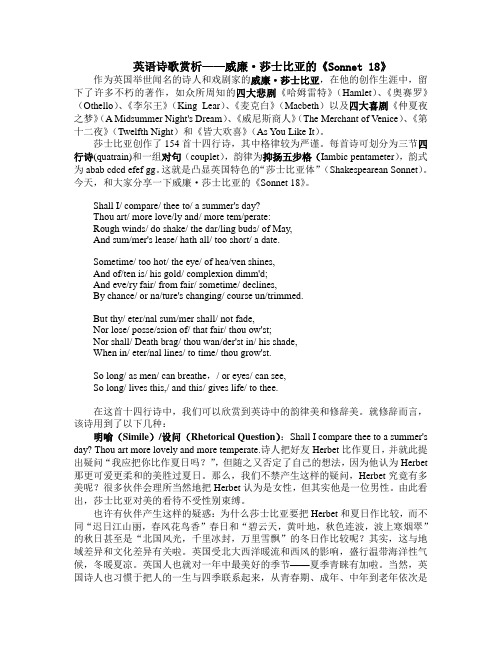
英语诗歌赏析——威廉·莎士比亚的《Sonnet 18》作为英国举世闻名的诗人和戏剧家的威廉·莎士比亚,在他的创作生涯中,留下了许多不朽的著作,如众所周知的四大悲剧《哈姆雷特》(Hamlet)、《奥赛罗》(Othello)、《李尔王》(King Lear)、《麦克白》(Macbeth)以及四大喜剧《仲夏夜之梦》(A Midsummer Night's Dream)、《威尼斯商人》(The Merchant of Venice)、《第十二夜》(Twelfth Night)和《皆大欢喜》(As You Like It)。
莎士比亚创作了154首十四行诗,其中格律较为严谨。
每首诗可划分为三节四行诗(quatrain)和一组对句(couplet),韵律为抑扬五步格(Iambic pentameter),韵式为abab cdcd efef gg。
这就是凸显英国特色的“莎士比亚体”(Shakespearean Sonnet)。
今天,和大家分享一下威廉·莎士比亚的《Sonnet 18》。
Shall I/ compare/ thee to/ a summer's day?Thou art/ more love/ly and/ more tem/perate:Rough winds/ do shake/ the dar/ling buds/ of May,And sum/mer's lease/ hath all/ too short/ a date.Sometime/ too hot/ the eye/ of hea/ven shines,And of/ten is/ his gold/ complexion dimm'd;And eve/ry fair/ from fair/ sometime/ declines,By chance/ or na/ture's changing/ course un/trimmed.But thy/ eter/nal sum/mer shall/ not fade,Nor lose/ posse/ssion of/ that fair/ thou ow'st;Nor shall/ Death brag/ thou wan/der'st in/ his shade,When in/ eter/nal lines/ to time/ thou grow'st.So long/ as men/ can breathe,/ or eyes/ can see,So long/ lives this,/ and this/ gives life/ to thee.在这首十四行诗中,我们可以欣赏到英诗中的韵律美和修辞美。
莎士比亚十四行诗第十八首的诗作分析

莎士比亚十四行诗第十八首的诗作分析莎士比亚十四行诗第十八首(Shall I compare thee to a summer's day)是所有十四行诗中最为著名和经典的一首。
在这首诗中,莎士比亚试图用一个美好的形象来比喻他所爱的人的美貌,并在最后一句话中表示出这种美丽将永久存在的信仰。
以下是对这首诗的分析。
首先,该诗的韵律模式为ABAB CDCD EFEF GG,这也是莎士比亚十四行诗的典型模式。
每个十四行诗被分为三个四行节和一个两行节,其中每个四行节采取交替韵脚,例如ABAB 和CDCD,以及相同的两个线条也是同一个韵脚。
在最后的两行节中,使用了不同的韵脚GG 来形成一个完整的抒情结尾。
除了韵律之外,莎士比亚还使用了形象和比喻来描绘他所爱的人的美貌。
在开头的两行,他将她的美貌比作夏天的美丽。
然而,他很快就批评了这个比喻,并指出夏天的美丽是瞬息的,而他所爱的人的美貌是永恒的。
这种对比的重要性在整个诗歌中体现得淋漓尽致,为读者创造了一种美丽和永久存在感的感觉。
此外,在诗的中间六行中,莎士比亚描述了她的眼睛,称它们为“至黑之白映金璋”的美丽,这表明他受她的目光所吸引。
通过这种描述,莎士比亚创造了一种独特的视觉体验,读者可以感到他所爱的人的美丽。
最后,诗的最后两行中,莎士比亚表达了他所爱的人的美丽将永久存在的信仰,并承诺将她的美丽延续到后人。
这种表达方式是诗歌的高潮,为读者留下了一个积极而安慰的结尾。
总之,莎士比亚十四行诗第十八首是一首经典的诗歌,通过精心的韵律和比喻表达了莎士比亚对他所爱的人的美丽和永久存在感的爱。
这是一首让人们记住和重读的诗歌,一个值得珍视的文学作品。
sonnet18诗歌解析
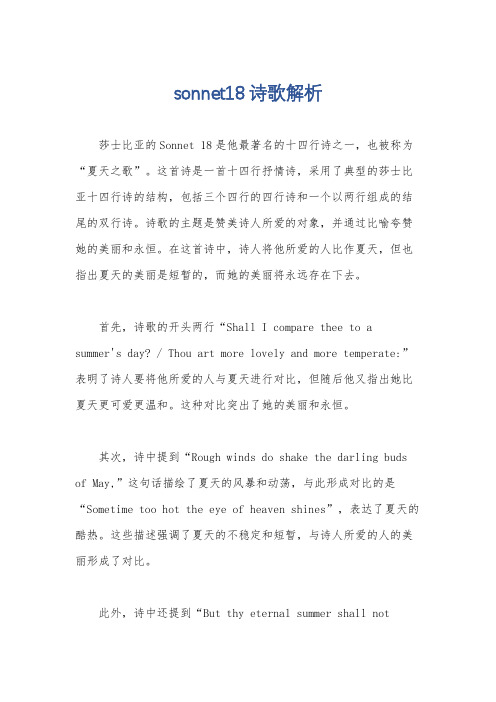
sonnet18诗歌解析莎士比亚的Sonnet 18是他最著名的十四行诗之一,也被称为“夏天之歌”。
这首诗是一首十四行抒情诗,采用了典型的莎士比亚十四行诗的结构,包括三个四行的四行诗和一个以两行组成的结尾的双行诗。
诗歌的主题是赞美诗人所爱的对象,并通过比喻夸赞她的美丽和永恒。
在这首诗中,诗人将他所爱的人比作夏天,但也指出夏天的美丽是短暂的,而她的美丽将永远存在下去。
首先,诗歌的开头两行“Shall I compare thee to a summer's day? / Thou art more lovely and more temperate:”表明了诗人要将他所爱的人与夏天进行对比,但随后他又指出她比夏天更可爱更温和。
这种对比突出了她的美丽和永恒。
其次,诗中提到“Rough winds do shake the darling buds of May,”这句话描绘了夏天的风暴和动荡,与此形成对比的是“Sometime too hot the eye of heaven shines”,表达了夏天的酷热。
这些描述强调了夏天的不稳定和短暂,与诗人所爱的人的美丽形成了对比。
此外,诗中还提到“But thy eternal summer shall notfade”,这句话表达了诗人对所爱人美丽永恒的信念,即使时间流逝,她的美丽也不会凋谢。
最后,诗歌的结尾两行“So long as men can breathe oreyes can see, / So long lives this, and this gives life to thee.”表达了诗人的信念,即只要人类存在,这首诗也将永存下去,而她的美丽也将因此而得以永生。
总的来说,Sonnet 18是一首赞美之歌,通过对比夏天的短暂和变化与所爱人的永恒美丽,表达了诗人对所爱人的赞美和珍视之情。
这首诗以其优美的语言和深刻的意境,成为了莎士比亚诗歌中的经典之作。
sonnet 18诗歌赏析
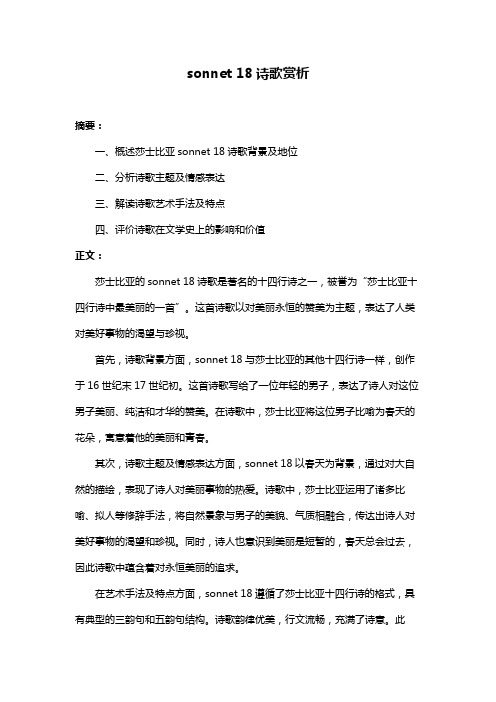
sonnet 18诗歌赏析摘要:一、概述莎士比亚sonnet 18诗歌背景及地位二、分析诗歌主题及情感表达三、解读诗歌艺术手法及特点四、评价诗歌在文学史上的影响和价值正文:莎士比亚的sonnet 18诗歌是著名的十四行诗之一,被誉为“莎士比亚十四行诗中最美丽的一首”。
这首诗歌以对美丽永恒的赞美为主题,表达了人类对美好事物的渴望与珍视。
首先,诗歌背景方面,sonnet 18与莎士比亚的其他十四行诗一样,创作于16世纪末17世纪初。
这首诗歌写给了一位年轻的男子,表达了诗人对这位男子美丽、纯洁和才华的赞美。
在诗歌中,莎士比亚将这位男子比喻为春天的花朵,寓意着他的美丽和青春。
其次,诗歌主题及情感表达方面,sonnet 18以春天为背景,通过对大自然的描绘,表现了诗人对美丽事物的热爱。
诗歌中,莎士比亚运用了诸多比喻、拟人等修辞手法,将自然景象与男子的美貌、气质相融合,传达出诗人对美好事物的渴望和珍视。
同时,诗人也意识到美丽是短暂的,春天总会过去,因此诗歌中蕴含着对永恒美丽的追求。
在艺术手法及特点方面,sonnet 18遵循了莎士比亚十四行诗的格式,具有典型的三韵句和五韵句结构。
诗歌韵律优美,行文流畅,充满了诗意。
此外,诗人巧妙地运用了押韵、抑扬顿挫等手法,使诗歌更具音乐性。
在语言上,莎士比亚运用了大量生动的描绘性词汇,形象地展现了大自然的美丽。
最后,在文学史上的影响和价值方面,sonnet 18被誉为莎士比亚十四行诗的代表作之一,对后世文学创作产生了深远的影响。
这首诗歌展示了莎士比亚卓越的文学才华和审美观,为后世诗人树立了典范。
同时,sonnet 18也成为了英语文学史上不可或缺的一部分,丰富了英语诗歌的传统。
总之,莎士比亚的sonnet 18是一首表达了对美丽永恒追求的诗歌。
通过对春天景象和男子美貌的赞美,诗人展现了人类对美好事物的渴望与珍视。
SONNET 18赏析
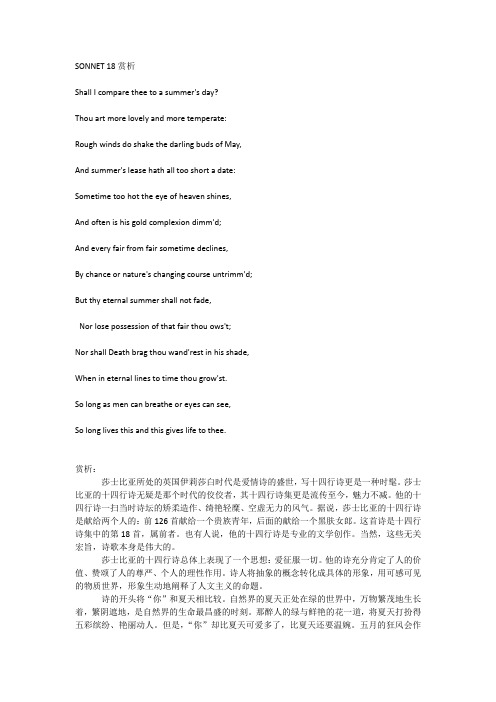
SONNET 18赏析Shall I compare thee to a summer's day?Thou art more lovely and more temperate:Rough winds do shake the darling buds of May,And summer's lease hath all too short a date:Sometime too hot the eye of heaven shines,And often is his gold complexion dimm'd;And every fair from fair sometime declines,By chance or nature's changing course untrimm'd;But thy eternal summer shall not fade,Nor lose possession of that fair thou ows't;Nor shall Death brag thou wand'rest in his shade,When in eternal lines to time thou grow'st.So long as men can breathe or eyes can see,So long lives this and this gives life to thee.赏析:莎士比亚所处的英国伊莉莎白时代是爱情诗的盛世,写十四行诗更是一种时髦。
莎士比亚的十四行诗无疑是那个时代的佼佼者,其十四行诗集更是流传至今,魅力不减。
他的十四行诗一扫当时诗坛的矫柔造作、绮艳轻糜、空虚无力的风气。
据说,莎士比亚的十四行诗是献给两个人的:前126首献给一个贵族青年,后面的献给一个黑肤女郎。
这首诗是十四行诗集中的第18首,属前者。
莎士比亚十四行诗sonnet 18译文比较研究
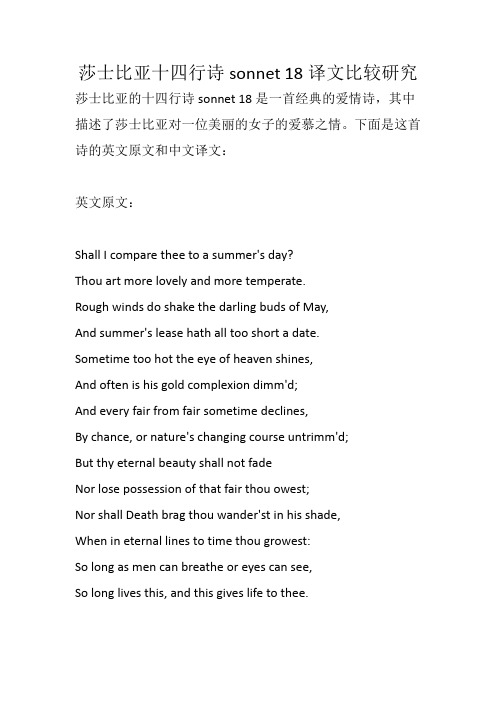
莎士比亚十四行诗sonnet 18译文比较研究莎士比亚的十四行诗sonnet 18是一首经典的爱情诗,其中描述了莎士比亚对一位美丽的女子的爱慕之情。
下面是这首诗的英文原文和中文译文:英文原文:Shall I compare thee to a summer's day?Thou art more lovely and more temperate.Rough winds do shake the darling buds of May,And summer's lease hath all too short a date.Sometime too hot the eye of heaven shines,And often is his gold complexion dimm'd;And every fair from fair sometime declines,By chance, or nature's changing course untrimm'd;But thy eternal beauty shall not fadeNor lose possession of that fair thou owest;Nor shall Death brag thou wander'st in his shade,When in eternal lines to time thou growest:So long as men can breathe or eyes can see,So long lives this, and this gives life to thee.中文译文:我可以把你比作一个夏日吗?你更加可爱,更加温和。
五月里,狂风摇晃着娇贵的花蕾,夏天的收益只有短暂的期限。
有时太阳的眼睛灼热地闪耀,经常他的金色肤色变得黯淡;美女们都有时会衰顿,不是因为命运,就是因为自然的变化;但是你永恒的美丽不会消逝,也不会失去那份你应有的美丽;死亡也不会夸耀说你走进他的阴影,当你在永恒的诗句中与时光同长:只要人们还能呼吸或眼睛能看见,这首诗就会存在,并为你增添生命。
英语学习资料:莎士比亚十四行诗18中英对照

英语学习资料:莎士比亚十四行诗18中英对照莎士比亚十四行诗18中英对照莎士比亚(1564-1616)是英国文艺复兴时期伟大的剧作家、诗人,代表作有四大悲剧:《哈姆雷特》(Hamlet)、《奥赛罗》(Othello)、《李尔王》(King Lear)、《麦克白》(Mac Beth)。
莎士比亚的十四行诗(son)体裁诗集总共收录了154首诗,本文是第十八首。
Shall I pare thee to a summer's day?Thou art more lovely and more temperate:Rough winds do shake the darling buds of May,And summer's lease hath all too short a date:我怎么能够把你来比作夏天?你不独比它可爱也比它温婉:狂风把五月宠爱的嫩蕊作践,夏天出赁的期限又未免太短:Sometime too hot the eye of heaven shines,And often is his gold plexion dimmed,And every fair from fair sometime declines,By chance, or nature's changing course untrimmed:天上的眼睛有时照得太酷烈,它那炳耀的金颜又常遭掩蔽:被机缘或无常的天道所摧折,没有芳艳不终于雕残或销毁。
But thy eternal summer shall not fade,Nor lose possession of that fair thou ow'st,Nor shall death brag thou wander'st in his shade, 但是你的长夏永远不会雕落,也不会损失你这皎洁的红芳,或死神夸口你在他影里漂泊,When in eternal lines to time thou grow'st,So long as men can breathe, or eyes can see,So long lives this, and this gives life to thee.当你在不朽的诗里与时同长。
莎士比亚第十八首十四行诗的形式主义赏析(英文)

莎士比亚第十八首十四行诗的形式主义赏析(英文)形式主义赏析:Shall I compare thee to a summer's day?Thou art more lovely and more temperate:Rough winds do shake the darling buds of May,And summer's lease hath all too short a date:1. 诗歌形式:莎士比亚第十八首十四行诗,使用了英式十四行诗形式,也称为修辞行。
2. 修辞手法:- 比喻:将恋人与夏日相比,强调恋人的美丽优雅超过时间的侵蚀。
- 对比:描绘夏季的不稳定和短暂与恋人的永恒之美对比,更突出了恋人的美丽。
- 比较:通过对恋人和夏日的比较,表达恋人的独一无二和令人难以忘怀的特质。
3. 音乐性:在这首诗中,莎士比亚浪漫而缠绵的语言和优美的旋律结合在一起,使诗歌具有很强的音乐性和节奏感。
4. 押韵方式:该诗歌的押韵方式为ABAB CDCD EFEF GG,以E和F行的半韵结尾,最后两行为完美押韵。
5. 节奏感:莎士比亚使用了不同音节的组合,以创造格律完美的节奏感。
最令人印象深刻的是第一行的iambic pentameter,强调了整首诗的韵律。
And summer's lease hath all too short a date:Sometime too hot the eye of heaven shines,And often is his gold complexion dimm'd;And every fair from fair sometime declines,By chance or nature's changing course untrimm'd;6. 表现手法:- 修饰:使用修辞手法修饰夏季的短暂和时刻的不稳定,以突出恋人的永恒美。
- 1、下载文档前请自行甄别文档内容的完整性,平台不提供额外的编辑、内容补充、找答案等附加服务。
- 2、"仅部分预览"的文档,不可在线预览部分如存在完整性等问题,可反馈申请退款(可完整预览的文档不适用该条件!)。
- 3、如文档侵犯您的权益,请联系客服反馈,我们会尽快为您处理(人工客服工作时间:9:00-18:30)。
莎士比亚的第18首十四行诗的英文赏析我能否将你比作夏天?你比夏天更美丽温婉。
狂风将五月的蓓蕾凋残,夏日的勾留何其短暂。
休恋那丽日当空,转眼会云雾迷蒙。
休叹那百花飘零,催折于无常的天命。
唯有你永恒的夏日常新,你的美貌亦毫发无损。
死神也无缘将你幽禁,你在我永恒的诗中长存。
只要世间尚有人吟诵我的诗篇,这诗就将不朽,永葆你的芳颜。
这首诗的艺术特点首先是在于它有着双重主题:一是赞美诗人爱友的美貌,二是歌颂了诗歌艺术的不朽力量。
其次就是诗人在诗中运用了新颖的比喻,但又自然而生动。
Sonnet 18, often alternately titled Shall I compare thee to a summer's day?, is one of the best-known of 154 sonnets written by the English playwright and poet William Shakespeare. Part of the Fair Youth sequence (which comprises sonnets 1-126 in the accepted numbering stemming from the first edition in 1609), it is the first of the cycle after the opening sequence now described as the Procreation sonnets. Most scholars now agree that the original subject of the poem, the beloved to whom the poet is writing, is a male, though the poem is commonly used to describe a woman.In the sonnet, the poet compares his beloved to the summer season, and argues that his beloved is better. The poet also states that his beloved will live on forever through the words of the poem. Scholars have found parallels within the poem to Ovid's Tristia and Amores, both of which have love themes. Sonnet 18 is written in the typical Shakespearean sonnet form, having 14 lines of iambic pentameter ending in a rhymed couplet. Detailed exegeses have revealed several double meanings within the poem, giving it a greater depth of interpretation.Sonnet 18 is a typical English or Shakespearean sonnet. It consists of three quatrains followed by a couplet, and has the characteristic rhyme scheme: abab cdcd efef gg. The poem carries the meaning of an Italian or Petrarchan Sonnet. Petrarchan sonnets typically discussed the love and beauty of a beloved, often an unattainable love, but not always.[5] It also contains a volta, or shift in the poem's subject matter, beginning with the third quatrain.A facsimile of the original printing of Sonnet 18.The poem starts with a line of adoration to the beloved—"Shall I compare thee to a summer's day?" The speaker then goes on to say that the beloved being described is both "more lovely and more temperate" than a summer's day. The speaker lists some things that are negative about summer. It is too short—"summer's lease hath alltoo short a date"—and sometimes the sun shines too hot—"Sometime too hot the eye of heaven shines." However, the beloved being described has beauty that will last forever, unlike the fleeting beauty of a summer's day. By putting his love's beauty into the form of poetry, the poet is preserving it forever by the power of his written words. "So long as men can breathe, or eyes can see, So long lives this, and this gives life to thee." The hope is that the two lovers can live on, if not through children, then through the poems brought forth by their love which, unlike children, will not fadeA major feature of this poem - analogy. Begins with the first sentence, put "you" and "Summer" as a analogy, compare the second line of the initial determination: Are you more lovely than the summer, more gentle. The difference is due to produce its in-depth analysis of 3 to 14 lines. Specifically, the first line of 3.4.5.6.7.8 enumerated the "summer" all kinds of regrets, and 9.10.11.12.13.14 line tells the "you" all kinds of advantages compared to the natural draw a final conclusion: "You" is far better than "Summer," "you" because in his poetry between the lines but also has a life, and time forever. Also noteworthy is the verse 13 and 14 are also, by analogy emphasized the "eternal nature."Throughout the poem, the poet freely to the "you" talk, it seems that "you" is a living person, to listen to his voice, understanding his thinking. So this poem can be said to be people in the application of techniques based on the written. The poem "You" refers to an object, academia, there are two explanations, one view is that it refers to beauty, and the other that it refers to poetry to express the good things. Now most scholars prefer the latter.One of the best known of Shakespeare’s sonnets, Sonnet 18 is memorable for the skillful and varied presentation of subject matter, in which the poet’s feelings reach a level of rapture unseen in the previous sonnets. The poet here abandons his quest for the youth to have a child, and instead glories in the youth’s beauty.On the surface, the poem is simply a statement of praise about the beauty of the beloved; summer tends to unpleasant extremes of windiness and heat, but the beloved is always mild and temperate. Summer is incidentally personified as the "eye of heaven" with its "gold complexion"; the imagery throughout is simple and unaffected, with the "darling buds of May" giving way to the "eternal summer", which the speaker promises the beloved. The language, too, is comparatively unadorned for the sonnets; it is not heavy with alliteration or assonance, and nearly every line is its own self-contained clause--almost every line ends with some punctuation, which effects a pause. Initially, the poet poses a question―”Shall I compare thee to a summer’s day?”―and then reflects on it, remarking that the youth’s beauty far surpasses summer’s delights. The imagery is the very essence of simplicity: “wind”and “buds.”In the fourth line, legal terminology―”summer’s lease”―is introduced in contrast to the commonplace images in the first three lines. Note also the poet’s use of extremes in the phrases “more lovely,”“all too short,”and “too hot”; these phrases emphasize the young man’s beauty.Although lines 9 through 12 are marked by a more expansive tone and deeper feeling, the poet returns to the simplicity of the opening images. As one expects in Shakespeare’s sonnets, the proposition that the poet sets up in the first eight lines―that all nature is subject to imperfection―is now contrasted in these next four lines beginning with “But.”Although beauty naturally declines at some point―”And every fair from fair sometime declines”―the youth’s beauty will not; his unchanging appearance is atypical of nature’s steady progression. Even death is impotent against the youth’s beauty. Note the ambiguity in the phrase “eternal lines”: Are these “lines”the poet’s verses or the youth’s hoped-for children? Or are they simply wrinkles meant to represent the process of aging? Whatever the answer, the poet is jubilant in this sonnet because nothing threatens the young man’s beautiful appearance.Sonnet 18 is the first poem in the sonnets not to explicitly encourage the young man to have children. The "procreation" sequence of the first 17 sonnets ended with the speaker's realization that the young man might not need children to preserve his beauty; he could also live, the speaker writes at the end of Sonnet 17, "in my rhyme." Sonnet 18, then, is the first "rhyme"--the speaker's first attempt to preserve the young man's beauty for all time. An important theme of the sonnet (as it is an important theme throughout much of the sequence) is the power of the speaker's poem to defy time and last forever, carrying the beauty of the beloved down to future generations. The beloved's "eternal summer" shall not fade precisely because it is embodied in the sonnet: "So long as men can breathe or eyes can see," the speaker writes in the couplet, "So long lives this, and this gives life to thee."大多数莎学家认为,是作者赞美好友的超常之美的。
